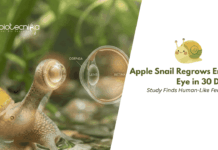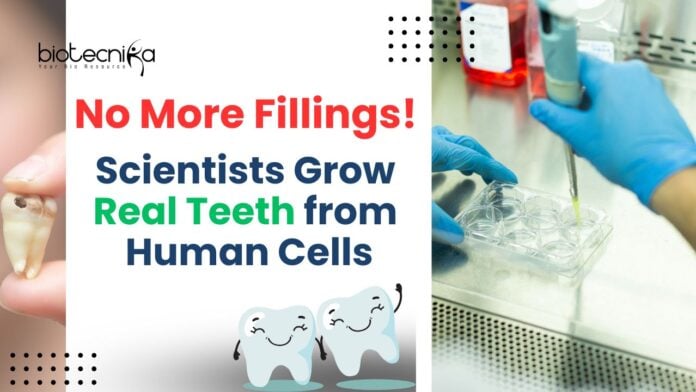Scientists Grow Real Teeth from Human Cells – No More Fillings
From little ones to grown-ups, most of us are fond of sweets! Whether a small sticky candy or a big sugar-coated dessert, it’s a go-to for all occasions. But a sweet-tooth person’s painful price comes when there are consequences like dental cavities or tooth decay. All these could lead to much more costly dental treatments.
Now, this might change soon with a recent scientific discovery by some researchers in the UK that would be capable of restoring naturally damaged teeth, doing away with the need for fillings altogether, if not implants.
Understanding the limitations of Traditional Dental Treatments
Whenever a person is suffering from tooth damage or loss of a tooth, the only way to restore the missing tooth is by implantation or filling procedures. These traditional methods have their disadvantages, such as using fillings for a missing tooth, which can damage or weaken the structure gradually. This can further lead to other complications, like further decay of the tooth or sensitivity issues. Implants, on the other hand, can cause permanent complex damage as they require invasive surgical procedures.
Dr. Xuechen Zhang from the Faculty of Dentistry, Oral & Craniofacial Sciences at King’s College London notes that both solutions are artificial and don’t fully restore natural tooth function, potentially leading to long-term complications.
To overcome or avoid these complications, researchers from King’s College London developed an innovative idea. They created a hydrogel matrix that allows cell-cell communication and further differentiation of cells into tooth cells. This will lead to the development of natural teeth.
Advantages of Lab-Grown Teeth
The new innovative lab-grown teeth have multiple advantages over the traditional methods that dentists used earlier. Firstly, the lab-grown teeth have the capability of natural integration. Unlike the risks involved with conventional implantation techniques, here the teeth can integrate easily into the jawbone, and this will also reduce the risk of rejection.
The second advantage includes the self-healing property of these lab-grown teeth. In case of damage or breakage of traditionally implanted teeth, they cannot be repaired or regrown, unlike lab-grown teeth. The last advantage is the long-lasting life. Lab-grown teeth are highly durable.
The Science Behind the Innovation – Scientists Grow Real Teeth from Human Cells
The key to this breakthrough lies in the hydrogel matrix developed by the researchers. This matrix enables dental epithelial and mesenchymal cells to communicate effectively, initiating the process of tooth formation. By replicating the environment of early tooth development, scientists can recreate the process of developing teeth in the lab.
Implications for the Future
This invention can completely transform dental treatment if it is effective in larger trials. This will automatically decrease the requirement for artificial therapies. Fillings and implants will become outdated procedures once patients can regrow their teeth. The procedure also holds an added advantage as it is cost-effective. By offering a longer-lasting solution, this approach lowers the total cost of dental procedures. Patients may feel more confident and have better oral health when their teeth look and work like natural ones.
Dr. Bibhakar Ranjan, a dental surgeon and researcher in Bonn, Germany, emphasizes that this breakthrough could change how dental treatments are planned and followed worldwide, offering biologically compatible and aesthetically pleasing solutions to patients.
What It Means for India With Scientists Grow Real Teeth from Human Cells
Most people in the rural sector, as well as urban regions, face significant dental issues in India. Millions of people experience tooth loss due to untreated cavities, gum disease, and delayed access to dental care, particularly in poor and rural areas. Many people avoid the dentist because of the exorbitant fees, their dread of unpleasant treatments, or their unawareness or ignorance of maintaining good oral hygiene.
Bonn, Germany-based dental surgeon and researcher Dr. Bibhakar Ranjan emphasizes the importance of this discovery for nations such as India. Cavities and a lack of dental care cause many people to lose their teeth. This innovation may be a long-term fix if it is practical and accessible to everyone, he says.
The idea that teeth might be able to mend themselves, much like how a cut or wound on our skin does naturally over time, is the most fantastic part of this invention.
These self-renewing teeth have the potential to completely transform dental care in India if they are evaluated and used in practical settings. In addition to restoring their smiles, people could create a more natural and healthy oral environment.
A significant development in regenerative medicine and dentistry is the creation of lab-grown teeth. Researchers are opening the door to more effective, long-lasting, natural dental treatments by using the body’s cells to rebuild teeth. As this technology develops, it has the potential to revolutionize dental care and enhance the lives of many people.























